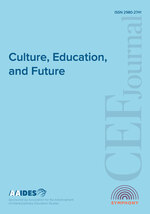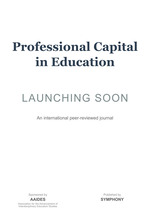Pedagogy, demagogy, and subjectness: Encounter and responsibility
DOI:
https://doi.org/10.70116/3065457273Keywords:
Currere, pedagogy, demagogy, subjectivity in educationAbstract
The article delves into the nuanced relationship between pedagogy and demagogy, analyzing how they shape the educational experience. It highlights that when pedagogy loses its existential focus, it risks turning into demagogy, prioritizing control over education's transformative potential. The author argues for a pedagogy that values subjectivity, intuition, and the inherent uncertainty of educational encounters. Using poetic language, the author portrays teachers as oscillating between the roles of artists and entertainers, when addressing the responsibility consequent of the subjective encounter. The piece suggests that educational encounters should be approached with the same wonder as one feels when encountering the sea and other elemental beings, recognizing the interplay between the vastness of existence and human life's limitations. The astonishment consequent of these encounters engages both students and teachers in a shared journey of self-discovery, uncovering new facets of their identities through their interactions. Through autobiographical narrative and philosophical discourse, the work emphasizes the need for educators to engage deeply with the subjective dimensions of teaching, fostering spaces where both teachers and students can explore their identities and responsibilities in relation to each other and the world.
Downloads
References
Adams, P. (2022). Scotland and pedagogy: Moving from the anglophone towards the continental. Nordic Studies in Education, 42(1): 105–121.
Andrade, M. (1963). O baile das quatro artes [The four arts dance]. Livraria Martins Editôra. (Original work published 1943).
Arendt, H. (1954/1961). Between past and future: Eight exercises in political thought. The Viking Press.
Balão Mágico. (1983). Superfantástico [Superawesome] [Song]. On A turma do balão mágico [the magic balloon crew]. Discos CBS.
Becket, S. (1983). Worstward Ho. Grove Press.
Biesta, G. (2008). Pedagogy with Empty Hands: Levinas, Education, and the Question of Being Human. In D. Egea-Kuehne (Ed.), Levinas and Education. Routledge.
Biesta, G. (2017). The Rediscovery of Teaching. Routledge.
Borges, J. L. (1974). Obras Completas [Complete works]. Emecé editors.
Derrida, J. (1978). Writing and difference. Trans. A. Bass. London and New York: Routledge.
Freire, P. (2001). Pedagogia dos sonhos possíveis [Pedagogy of possible dreams]. Unesp.
Friedrich, D., & Colmenares, E. (2017). Introduction. In D. Friedrich & E. Colmenares (Eds.). Resonances of El Chavo del Ocho in Latin American Childhood, Schooling, and Societies (pp. 1–16). Bloomsbury Academic.
Gil, G. (1984). Tempo rei [King time] [Song]. On A raça humana [Human race]. Warner Music Brazil.
Gombrich, E. H. (1954). The story of art. Phaidon.
Gordon, M. (2001). Introduction. In M. Gordon (Ed.), Hannah Arendt and education: Renewing our common world (pp. 1-9). Westview Press.
Hamilton, A. (2024). Art and entertainment: A philosophical exploration. Routledge.
Leggo, C. (1999). Research as poetic rumination: Twenty-six ways of listening to light. The Journal of Educational Thought, 33(2), 113–133.
Legião Urbana. (1989). Quando o sol bater na janela do teu quarto [When the sunshine hits your bedroom window] [Song]. On As quatro estações [Four seasons]. EMI.
Maia, T. (1971). Não quero dinheiro [Song]. On Tim Maia [Album]. Polydor Records.
McDonough, M. L. (2018). The evolution of demagoguery: An updated understanding of demagogic rhetoric as interactive and ongoing. Communication Quarterly, 66(2), 138–156.
Monte, M. (1989). Chocolate. On MM [Album]. EMI.
Moravčíková, E. (2020). Media manipulation and propaganda in the post-truth era. Media Literacy and Academic Research, 3(2), 23-37.
Palavra Cantada. (1996). Pomar [Orchard] [Song]. On Canções de brincar [Playful songs]. Palavra Cantada.
Phelan, A., M., & Clark, M. (2019). Autobiography, Aesthetics and Politics: Educating for World Spectatorship. Transnational Curriculum Inquiry 16(2), 62-73.
Phelan, A. M. (2015). Curriculum Theorizing and Teacher Education. Routledge.
Pinar, W. F. (2009). The Worldliness of a Cosmopolitan Education. Routledge.
Pinar, W. F. (2023). A praxis of presence in curriculum theory: Advancing currere against cultural crises in education. Taylor and Francis.
Pinar, W. F., & Grumet, M. R. (1976). Toward a poor curriculum. Kendall Hunt.
Ratcliffe, S. (Ed.). (2018). Oxford Essential Quotations (6 ed.). Oxford University Press. https://doi.org/10.1093/acref/9780191866692.001.0001
Sartre, J. (1962). Huis clos [No exit]. Prentice-Hall. (Original work published 1945)
Sartre, J. (1976). No exit. In M. Contat & M. Rybalka (Eds.). Sartre on theatre. Trans. F. Jellinek. Pantheon Books.
Schonmann, S. (2020). Aesthetics. In J. Wearing, M. Ingersoll, C. Deluca, B. Bolden, H. Ogden, & T. M. Christo (Eds.). Key concepts in curriculum studies: Perspectives on the fundamentals. (pp. 12-17) Routledge.
Seixas, R. (1974). Preludio [Prelude] [Song]. On Gita. Philips/Phonogram.
Siba e a Fuloresta. (2007). Toda Vez Que Eu Dou um Passo o Mundo Sai do Lugar [Every step I take, the world moves] [Album]. Ambulante Discos.
Snow, S. G. (2018). Bourgeois ideology and education: Subversion through pedagogy. Routledge.
Steudeman, M. J. (2019). Rethinking rhetorical education in times of demagoguery. Rhetoric Society Quarterly, 49(3), 297-314.
Thomas Roebers. (25 October, 2010). Foli (there is no movement without rhythm) original version by Thomas Roebers and Floris Leeuwenberg [Video]. YouTube.
Veloso, C. (1986). Dom de iludir [Gift of deception] [Song]. On Totalmente demais [Completelly awesome] Phillips.
Wang, H. (2021). Contemporary Daoism, organic relationality, and curriculum of integrative creativity. Information Age Publishing.
Downloads
Published
How to Cite
Issue
Section
License
Copyright (c) 2025 Symphony

This work is licensed under a Creative Commons Attribution 4.0 International License.










